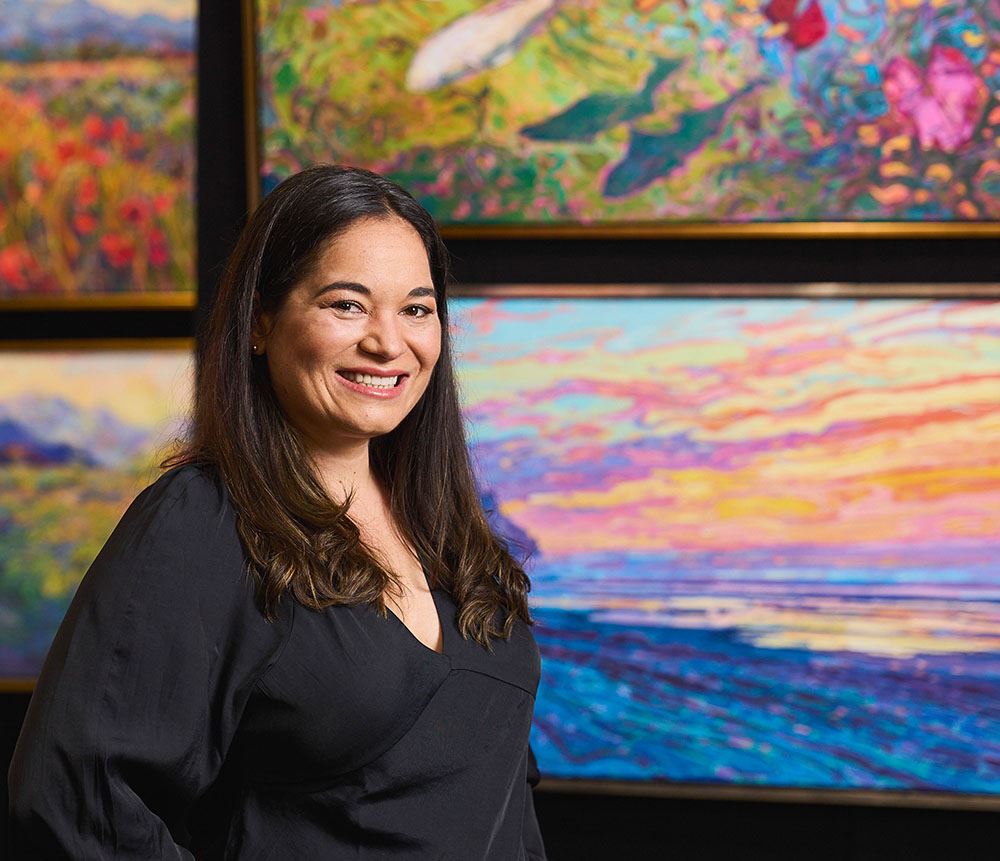
Code LOVE20 applied for 20% off!

Subtotal
$0
U.S. Shipping
FREE
Saved for Later
Shopping Cart

Code LOVE20 applied for 20% off!

Subtotal
$0
U.S. Shipping
FREE
Saved for Later

Gilded Arbor by Erin Hanson
Impressionism has a long history of painters that push the boundaries of artistic techniques. The original Impressionists used small, thin brush strokes laid side by side to capture the light and movement of a transient scene. Following in their footsteps, many styles of painting have since been developed by pioneers of Art.
Open Impressionism catches the attention at once as being a new style of painting. The colors are vibrant, pre-mixed, and un-mudded. The thick brush strokes are left to exist as they are placed, which preserves every tiny ridge in the paint left by the brush. This medley of texture pulls the eye along in an ever-moving dance within the landscape. From day break to sun down, the changing light over the surface of a painting flows in and out of the crevices in the paint, trailing behind itself ever changing shadows and colors.
The purpose of Open-Impressionism is to capture the true feeling of being outdoors, each painting more of an emotional work than a photographic representation. The wind pushing against your back, prickling the sweat in your hair, your feet sinking into the damp earth beneath an oak tree, eyes squinting against the sun, burrs in your socks, eyes moving endlessly across a perfect idyllic landscape; the purpose of a painting is to capture these fleeting experiences in a few swabs of paint.
More about Open Impressionism
Open Impressionism is unlike any other style of painting and truly stands by itself in the contemporary art world. While inspired by the impressionists of the past, Hanson has a more expressionistic manner of painting, and her works attempt to recapture the emotional content of the outdoors, instead of merely the light and forms of the landscape. While Open Impressionism was developed over the span of twenty years and certainly changed as the artist experimented and refined her techniques, there are some basic hallmarks of Open Impressionism that we can take note of.
Open Impressionism is best described as abstracted, contemporary impressionism. The brush strokes are loose and expressive, conveying a sense of movement and transient light. Because the brush strokes are applied alla-prima, without layering, the paintings have a mosaic or stained-glass quality to them. The underpainting is allowed to appear through the brush strokes, giving a sense of underlying light to the painting.
Erin Hanson pre-mixes her entire palette before she begins painting, planning out her colors in advance and mixing the full range of hues from only a few pure pigments, known as a “limited palette.” By limiting the colors on her palette to only four or five primary colors, Hanson can create a full range of pure and vibrant colors. Her paintings are never dull and muddied, but instead have a crystalline or back-lit appearance. She always focuses on the light in a composition, letting the shadows fade into indistinction.
When she paints, Hanson tries not to go over the same spot on the canvas more than once; she tries to “get it right the first time.” This has two effects: one, the brush strokes are very textured, since they have not been flatted out by repetitively going over the same place on the canvas; two, the paintings have a sense of spontaneity and freshness to them, and they never appear overworked or overly detailed. This impressionistic approach to painting allows the viewer to participate in the finished artwork – his imagination must “fill in the blanks,” instead of the having the whole literal landscape dictated to him like a photograph. When Hanson paints, she focuses on a single dramatic aspect of the landscape, and this single communication is what is felt in her paintings.
Fewer strokes is better in Open-Impressionism. Color choice is secondary. Texture and spontaneity are everything.

Arizona Sky by Erin Hanson
Discover the artist at the forefront of modern impressionism.

About Erin
ERIN HANSON has been painting in oils since she was 8 years old. As a teenager, she apprenticed at a mural studio where she worked on 40-foot-long paintings while selling art commissions on the side. After being told it was too hard to make a living as an artist, she got her degree in Bioengineering from UC Berkeley. Afterward, Erin became a rock climber at Red Rock Canyon, Nevada. Inspired by the colorful scenery she was climbing, she decided to return to her love of painting and create one new painting every week.
She has stuck to that decision, becoming one of the most prolific artists in history, with over 3,000 oil paintings sold to eager collectors. Erin Hanson’s style is known as "Open Impressionism" and is taught in art schools worldwide. With millions of followers, Hanson has become an iconic, driving force in the rebirth of impressionism, inspiring thousands of other artists to pick up the brush.